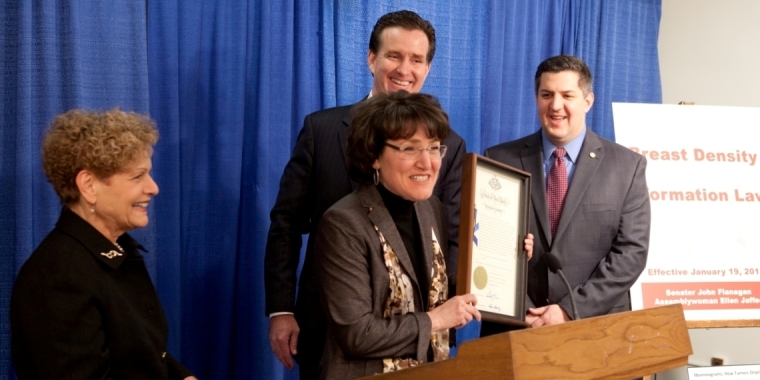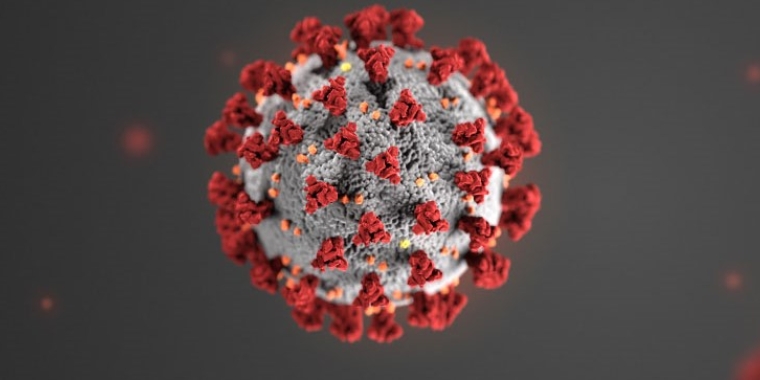
Senator Flanagan and Assemblywoman Jaffee Announce Life-Saving “Breast Density Information” Law In Effect
John J. Flanagan
January 22, 2013
-
ISSUE:
- Women's Health


Senator John J. Flanagan (2nd Senate District) and Assemblywoman Ellen Jaffee (97th Assembly District) announced that the life-saving “Breast Density Information” law, they jointly sponsored to help in the fight against breast cancer, is now in effect in New York State.
The new law (Chapter 265), which unanimously passed both the Assembly and the Senate, is the most comprehensive breast density law in the country. It is designed to improve the early detection of breast cancer by informing women of their breast density and encouraging them to discuss with their physicians the potential benefits of additional screening tests.
The new law requires that every mammography report given to a patient with dense breast tissue will inform the patient in plain, non-technical language that she has dense breast tissue and that she should discuss the potential benefit of further screenings with her physician.
“This legislation will provide women with access to important medical information they need to make decisions about their own health care and will, quite simply, save lives. Many women are unaware of their own breast density, that it can be linked to an increased risk of breast cancer and that dense breast tissue can make it difficult to detect tumors by mammography alone. Ensuring that all women are supplied with the information they need to make the most educated decisions about their health care will lead to earlier detection when the cancer is most treatable and survivable,” stated Senator Flanagan.
“We are going to save lives and change so much throughout our state and the country because New York’s comprehensive law empowers women with dense breast tissue, and it serves as a template for other states around the nation when they draft their own,” said Assemblywoman Jaffee, who authored the legislation along with Senator Flanagan.
The efforts to bring this law to New York State began when Senator Flanagan was contacted by JoAnn Pushkin, a constituent in his Senate district who is a breast cancer survivor-turned-advocate and founder of D.E.N.S.E. (Density Education National Survivors' Effort) NY.
Ms. Pushkin’s cancer went undiagnosed for five years because her annual mammograms did not detect a tumor obscured by dense breast tissue. She is a leader in the effort to raise awareness about this issue and worked closely with Senator Flanagan and Assemblywoman Jaffee to bring this life-saving new law to New York. Ms. Pushkin continues to advocate for the enactment of similar laws in 12 other states and at the federal level as well.
“New York women are now the first in the nation to be unequivocally informed if they have dense breasts. This law will save lives and I speak on behalf of all New York women when I thank Senator Flanagan and Assemblywoman Jaffee for their untiring commitment to get breast density information to New York women and thank Governor Cuomo for his signature,” said Ms. Pushkin. “Research indicates that every year in New York at least 2,500 women with dense breasts leave their mammograms being told the results are "normal/negative" but who actually have invasive breast cancer- that would be found - if they were sent for screening ultrasounds. The ‘Breast Density Information’ law means women will now be told of their own density and its associated risks and encouraged to discuss further screening with their doctors. Well done, Albany.”
According to leading medical studies, breast cancer is four to six times more likely in women with dense breast tissue, and mammograms fail to detect approximately 40% to 50% of tumors in dense tissue since this condition obscures their presence. Despite those facts, a recent Harris Interactive survey found that 95% of women do not know their breast density even though it is a risk factor, and less than one-in-ten women learn about breast density from their physician.
"Despite improvements in treatment, breast cancer remains a leading cause of premature death for women. Breast density is both one of the strongest risk factors for developing breast cancer and one of the greatest factors reducing the effectiveness of mammography. There are now methods to improve breast cancer detection in addition to standard mammography, and women should become aware of these options. As we begin to tailor our screening strategies, it is important that all women screened continue to have mammography, as many cancers are still detected early by mammography even in women with dense tissue, and mammography remains the only screening method known to reduce deaths due to breast cancer. As new technologies become available, we must monitor their impact in terms of cancer detection and, ultimately, reducing the number of cancers diagnosed at later stages because of a lump or other symptoms. Breast density inform legislation will allow women to take an increasingly active role in their breast health, and also will require practitioners and insurers to make a concerted effort to track outcomes as we move forward in implementing improved methods of detection and treatment," said Wendie A. Berg, MD, PhD, Professor of Radiology, University of Pittsburgh School of Medicine, Magee-Womens Hospital of UPMC.
For more information on this legislation and the fight against breast cancer please click here.
Share this Article or Press Release
Newsroom
Go to NewsroomBudget Statement From Senator Flanagan
March 17, 2020

Statement From Senator Flanagan
March 16, 2020



